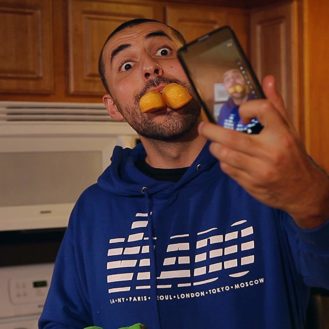While far from perfect, director Harry Wootliff’s (Only You) drama True Things is an excellent showcase for actor Ruth Wilson, as well as a challenging portrait of a woman caught between societal expectations and her own desire.
Based on the novel True Things About Me by Deborah Kay Davies, the film follows a young woman named Kate (Wilson, of TV’s Luther and Jane Eyre). Bored with her office job, and daydreaming of a faceless hunk that she imagines will sweep her off her feet, Kate is sleep-walking through her life — until she has a rough (and against the rules) sexual liaison with a client (Tom Burke).
Kate’s obsession with the stranger, listed only as “Blond” in her phone, soon threatens her safe and stable life. At first, the sex transforms Kate’s world from a grey hell of cubicles and concrete to a colourful, lush, and textured universe. The sets, costumes, and cinematography mirror this shift. But mixed messages from her mother and best friend, who want to see Kate in a “proper” relationship, prevent her from being able to properly assess her new love interest.
True Things feels uncomfortable, like listening to a favorite pop song played on an out of tune guitar. This is intentional. The story follows all the expected beats of a romantic comedy but infuses them with anxiety and dread. As the red flags become increasingly difficult to ignore, it becomes harder and harder for Kate (and by extension, the viewer) to buy into her fantasy. The realization that “Blond” could pose a serious physical, and emotional, threat begins to dawn.
Though Kate lies to many people over the course of the film, the person she is deceiving most about her relationship with “Blond” is herself.
This is a movie that asks more questions than it answers. What does it mean to push women into the fantasy of monogamous relationships and marriage without teaching them about independence and self respect? Who are heterosexual romance tropes really serving? Why do young women continue to buy into harmful, sexist narratives and pursue relationships with toxic men?
The juxtaposition of Kate’s romantic fantasy and grim reality occasionally crosses the line from uncomfortable to absurd. Director/co-writer Wootliff uses these moments to insert memorable slashes of satire. When she arrives home from a bad date, Kate finds “Blond” standing in the rain, waiting for her. It’s a scene dripping with romantic cliché that is quickly, and cleverly, turned on its head: “We’ll need to use your car,” Blond says matter-of-factly, as Kate swoons, “mine’s in the shop.”
The dysfunctional relationship sets off a string of behaviour that could be described as “self-destructive”, but that also liberate her from the structured life she so clearly despises.
At times, Kate’s words and actions are manic and seem out of proportion to the events happening around her. We don’t know enough about her past, or her relationships with her family and friends, to understand her response.
But do we need to?
By rendering Kate’s life as generic as possible, True Things suggests that there is something universal about her experiences. The confusing grey area between erotic fascination and toxic obsession, between the desire for love and the desire for social acceptance is not unique to one individual.
This is a film that can be read different ways. It may be, as Joanna Briscoe wrote in their 2010 review of Deborah Kay Davie’s novel, a story “of sickness” and an opportunity “to witness someone else’s nervous breakdown”.
Or it is a movie about awakening to the truth of ourselves. To the ugly things that we want and crave. And, perhaps, it is about learning to live in our own colourful world — on our own terms.
**********
Do You Tweet? Follow These Tweeple:
Shannon Page: @ShannonEvePage




Be the first to comment